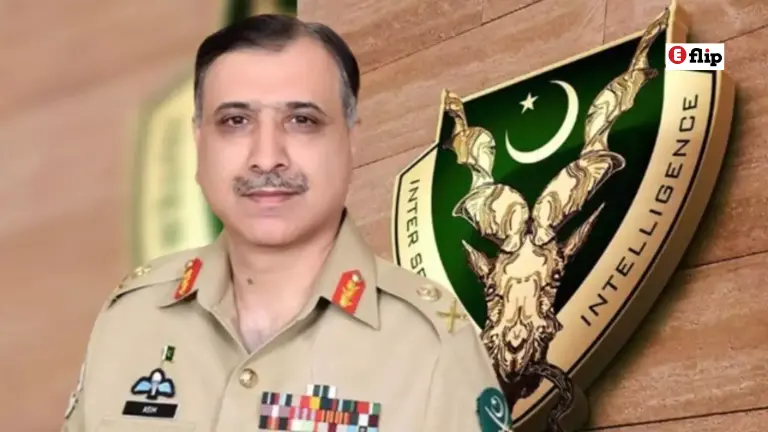On April 22, 2025, the idyllic Baisaran Valley in Pahalgam, Jammu and Kashmir, was devastated by a Pahalgam terrorist attack that killed 26 people, mostly tourists, and injured over 20. Claimed initially by The Resistance Front (TRF), a Lashkar-e-Taiba offshoot, the attack has escalated India-Pakistan tensions to a boiling point. Amid this crisis, Pakistan appointed Lt Gen Muhammad Asim Malik, the Director General of Inter-Services Intelligence (ISI), as its National Security Adviser (NSA) on April 30, 2025, a historic move as he retains his ISI role. For locals like Rafiq, a Pahalgam pony operator, and victims’ families like Sunita, mourning a lost daughter, the Pahalgam terrorist attack is a personal tragedy now entangled in geopolitical strife. This blog explores who Lt Gen Malik is, his new role, the challenges, India and Pakistan’s responses, and what lies ahead.
Who Is Lt Gen Muhammad Asim Malik?
Lt Gen Muhammad Asim Malik, born into a Punjabi Awan family in Shahpur, Sargodha, Punjab, is a three-star general with a distinguished military career. The son of Lt Gen (Retd.) Ghulam Muhammad Malik, he joined the Pakistan Military Academy’s 80th Long Course, earning the prestigious Sword of Honour in 1989. Commissioned into the 12th Baloch Regiment, Malik’s career spans critical roles, including commanding the 41st Infantry Division in Balochistan and an infantry brigade in Waziristan, both volatile regions. His academic credentials are equally impressive: a BSc from the University of Balochistan, studies at Fort Leavenworth (where he wrote a thesis on mountain warfare), and a PhD in US-Pakistan relations from Islamabad’s National Defence University, making him the first ISI chief with a doctorate.
Malik served as Chief Instructor at the National Defence University and an instructor at Quetta’s Command and Staff College. As Adjutant General (AG) at General Headquarters (GHQ) in Rawalpindi from October 2021, he oversaw administrative and disciplinary matters, including the court-martial of former ISI chief Lt Gen Faiz Hameed over corruption charges. Appointed ISI chief on September 30, 2024, succeeding Lt Gen Nadeem Anjum, Malik now holds the dual role of ISI Director General and NSA, a first in Pakistan’s history, consolidating his influence over security policy.
For Rafiq, whose cousin died in the Pahalgam terrorist attack, Malik’s appointment feels ominous. “We want peace, not more conflict,” he says, reflecting local fears of escalation.
Real-Time Updates: A Region in Crisis
The Pahalgam terrorist attack has triggered intense responses. As of May 1, 2025, Indian forces are hunting 4–6 terrorists in Jammu and Kashmir’s Pir Panjal range. Encounters in Bandipora (April 24) and Kulgam’s Redwani Payeen (ongoing) have killed one Lashkar-e-Taiba commander, with two policemen injured. The Jammu and Kashmir Police offer ₹20 lakh for information on suspects Asif Fauji, Suleman Shah, and Abu Talha, while the NIA probes Pakistan links, detaining 250 locals.
Pakistan’s Information Minister Attaullah Tarar warned on April 30 of an Indian strike within 24–36 hours, citing “credible intelligence.” UN Chief Antonio Guterres called India’s S Jaishankar and Pakistan’s Shehbaz Sharif on April 29, urging restraint. Protests in Delhi and Srinagar demand justice, while Kashmir’s tourism reels, with 70% hotel cancellations. The Pahalgam terrorist attack has left families like Sunita’s in grief. “My daughter was only 19,” she says, her voice breaking.
India’s Response: Unyielding Stance
India’s response to the Pahalgam terrorist attack is resolute. Prime Minister Narendra Modi granted the military “complete operational freedom,” vowing to pursue “perpetrators and backers to the ends of the earth.” India’s measures include:
- Indus Waters Treaty Suspension: Halting the 1960 treaty, impacting Pakistan’s water-dependent agriculture.
- Border and Airspace Closures: Shutting the Attari-Wagah border and banning Pakistani flights from Indian airspace.
- Diplomatic Downgrade: Expelling Pakistani military attachés and capping High Commission staff at 30.
- Media Bans: Blocking 16 Pakistani YouTube channels and social media accounts of celebrities like Hania Amir.
India appointed former R&AW chief Alok Joshi to lead its revamped National Security Advisory Board, signaling a robust security overhaul. Jaishankar, in talks with Guterres, emphasized accountability, briefing 25 nations to isolate Pakistan diplomatically.
Pakistan’s Response: Deflection and Defiance
Pakistan condemned the Pahalgam terrorist attack but denies involvement, with Sharif calling India’s accusations “empty rhetoric” and demanding a “neutral” investigation. Foreign Minister Ishaq Dar accused India of a “choreographed narrative.” Pakistan’s countermeasures include:
- High Alert: Declaring a military alert along the LoC, with firing reported for seven days.
- Reciprocal Bans: Closing airspace to Indian flights and expelling diplomats.
- Treaty Rejection: Labeling India’s treaty suspension an “act of war,” vowing a “full spectrum” response.
- UN Appeal: Sharif urged Guterres to mediate, invoking Kashmir’s UNSC resolutions.
Malik’s NSA appointment, announced via a Cabinet Division notification, centralizes Pakistan’s security strategy, aligning intelligence and policy under his command. His dual role, backed by Army Chief General Asim Munir, suggests preparation for heightened conflict.
Challenges: A Volatile Standoff
The Pahalgam terrorist attack poses complex challenges:
- Escalation Risk: Pakistan’s strike alert and India’s military freedom raise fears of a nuclear-armed clash. LoC firing, reported daily, heightens volatility.
- Intelligence Failures: India’s inability to preempt the attack, despite warnings, and Pakistan’s denial of TRF’s retracted claim expose gaps.
- Economic Fallout: Kashmir’s tourism, vital for Rafiq’s livelihood, faces collapse, while Pakistan’s agriculture braces for water shortages.
- Communal Tensions: The attack’s targeting of Hindu tourists fuels protests and risks anti-Muslim sentiment.
- Diplomatic Impasse: Guterres’ mediation faces hurdles, with India rejecting Kashmir talks and Pakistan deflecting blame.
Sunita’s plea—“I just want answers”—echoes the frustration of millions caught in this crisis.
What’s Next: A Precarious Path
The Pahalgam terrorist attack and Malik’s appointment signal a tense future:
- Military Operations: India’s manhunt may escalate to PoK strikes, risking Pakistan’s “decisive response.” Malik’s role will shape Pakistan’s counterstrategy.
- Diplomatic Maneuvers: Global calls from the US, Saudi Arabia, and Qatar for de-escalation may pressure both sides, but India’s focus on justice and Pakistan’s Kashmir rhetoric clash.
- Security Consolidation: Malik’s dual role streamlines Pakistan’s response to India, Afghanistan, and domestic unrest, but his October 2025 retirement looms.
- Economic Recovery: India must secure Kashmir’s tourism, while Pakistan faces water and trade crises.
- Long-Term Stability: Dismantling PoK’s 42 terror launchpads and countering TRF’s propaganda are critical.
A Human Tragedy Amid Power Plays
For Rafiq, the Pahalgam terrorist attack means a lost cousin and an empty shop. For Sunita, it’s a daughter gone forever. Lt Gen Muhammad Asim Malik’s rise as NSA, wielding unprecedented power, underscores Pakistan’s defensive posture, but it’s the people—Kashmiris, victims’ families, and ordinary citizens—who bear the cost. The Pahalgam terrorist attack is not just a geopolitical flashpoint; it’s a human cry for justice and peace. As Malik navigates this crisis, the world watches, hoping for restraint over retribution.
Touched by the Pahalgam terrorist attack or inspired by the call for peace? Share your thoughts or support for the victims in the comments. Want to make a difference? Donate to Kashmir relief funds, advocate for diplomacy, or follow our blog for updates. Let’s stand for justice and healing!








